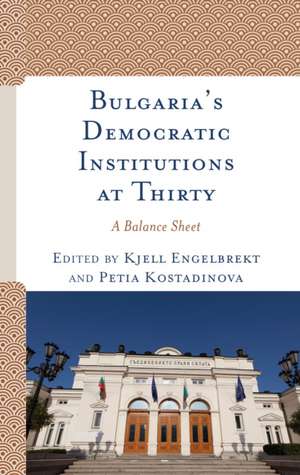BULGARIAS DEMOCRATIC INSTITUTICB
en Limba Engleză Hardback – 20 mai 2020
Preț: 750.69 lei
Preț vechi: 1028.34 lei
-27% Nou
Puncte Express: 1126
Preț estimativ în valută:
143.66€ • 155.100$ • 120.68£
143.66€ • 155.100$ • 120.68£
Carte tipărită la comandă
Livrare economică 22 aprilie-06 mai
Preluare comenzi: 021 569.72.76
Specificații
ISBN-13: 9781793607720
ISBN-10: 1793607729
Pagini: 350
Dimensiuni: 152 x 229 x 25 mm
Greutate: 0.64 kg
Editura: Rowman & Littlefield
ISBN-10: 1793607729
Pagini: 350
Dimensiuni: 152 x 229 x 25 mm
Greutate: 0.64 kg
Editura: Rowman & Littlefield
Notă biografică
Petia Kostadinova is associate professor in the Department of Political Science at the University of Illinois at Chicago.
Kjell Engelbrekt is professor at the Swedish Defence University, visiting professor at Stockholm University, and nonresident senior fellow at the Chicago Council on Global Affairs.
Kjell Engelbrekt is professor at the Swedish Defence University, visiting professor at Stockholm University, and nonresident senior fellow at the Chicago Council on Global Affairs.
Descriere
This collection analyzes the state of democratic institutions and civil society in Bulgaria. The contributors argue that despite the country's high level of civic participation, there remain significant obstacles to its full democratic development, such as corruption, political illegitimacy, populism, and weak judicial oversight.
